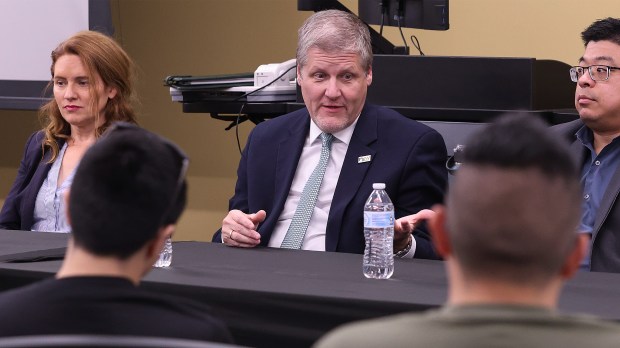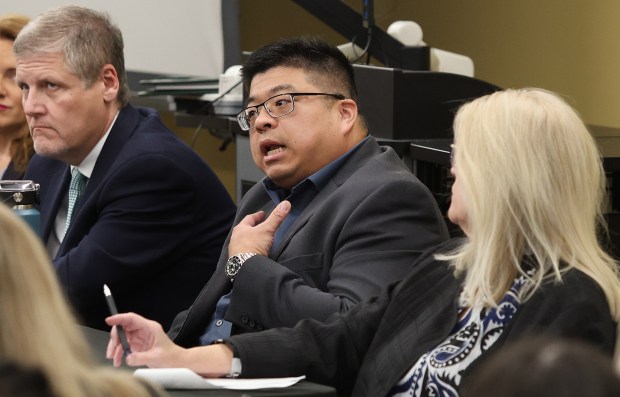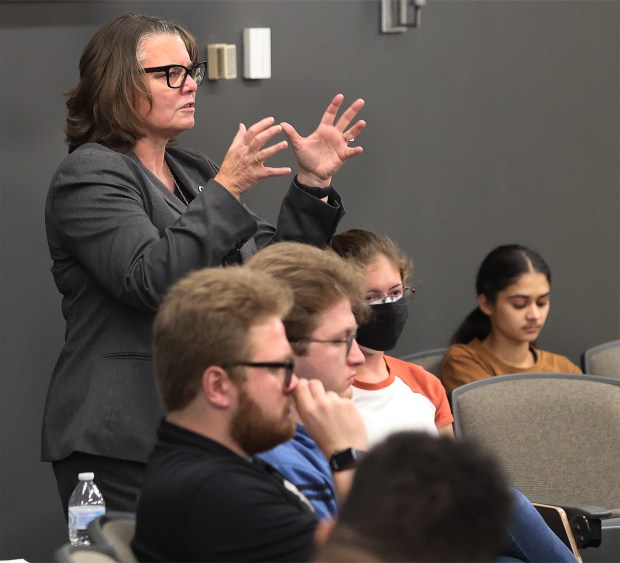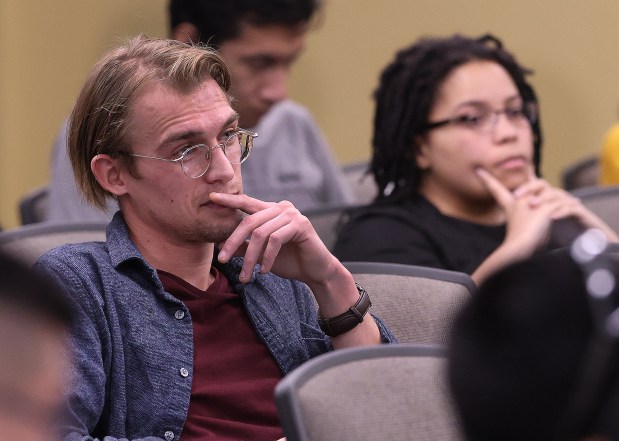As the Nov. 5 general election approaches, some Purdue University Northwest faculty warn that the United States might not know its next president on Election Day.
“Because this one is going to be so remarkably close, I think networks and states will be careful in calling the election,” said Richard Rupp, associate professor of political science at PNW.
Five of the university’s faculty members on Monday participated in an election-focused panel discussion at the school’s Hammond campus. Discussion topics included whether Indiana races will be competitive, how the electoral college works, and what constitutes a swing state.
The university hosted the discussion to help inform students and community members before heading to the polls, according to its website. Lisa Goodnight, vice chancellor for institutional advancement and professor of communication, moderated the discussion and asked various questions.
Jonathan Swarts, dean of University College and the Honors College, said in this election, Indiana races aren’t competitive. He believes U.S. Rep. Frank Mrvan, D-Highland, will win re-election in Lake County, and Mike Braun, a Republican, will win in the governor’s race.
Mrvan is hoping to secure his third term in Congress, and he’s facing off against Lake County Councilman and GOP Chair Randy Niemeyer. Braun is a former senator facing off against Democrat Jennifer McCormick and Libertarian Donald Rainwater.

Rupp shared Swarts’ opinions on the Indiana races.
“The last exciting race in Indiana was Barack Obama in 2008,” Rupp said. “He won Indiana, and that was really quite extraordinary. This campus was very active, and students were very engaged in that race.”
Lake County runs “deeply blue,” Goodnight said, which some panel members said helps Mrvan. Rupp said the current Representative has been campaigning hard late in the race, which he believes indicates Mrvan will win.

While faculty believe the Indiana races aren’t as competitive, they agreed the presidential election will be close throughout the country, particularly in swing states.
Arizona, Georgia, Michigan, Nevada, North Carolina, Pennsylvania and Wisconsin are the seven swing states where Democratic and Republican candidates have roughly equal levels of support.
Meg Rincker, professor of political science, said both former President Donald Trump and Vice President Kamala Harris are spending more time campaigning in swing states because they could help sway the election.
The candidates are more focused on electoral votes in those states, not the popular vote, Rincker said.

The Electoral College is the system that chooses the president, said Yu Ouyang, who is an associate professor for political science and the English and World Languages and History, Philosophy, Politics and Economics associate department chair.
“We don’t directly vote for presidents in this country,” Ouyang said. “Instead, when you go to the polling place, you’re actually voting for a slate of electors who are then promised to vote for the person they’re supposed to.”
Ouyang called the Electoral College a “very indirect way” to vote for president. The difference between electoral and popular votes sometimes confuses people, Ouyang said, because one candidate can win the popular vote but lose the election, such as Hillary Clinton in 2016. Another example was Al Gore in 2000.
“The Democratic candidate has an advantage nationwide in terms of popular vote,” Ouyang said, “but the Republican candidate can have the Electoral College.”
Rupp asked why the American public hasn’t amended the Electoral College out of the system. It was created to represent the states, Swarts said, and because one party has an incentive with it, not enough people want to abolish the practice.
“It wasn’t intended to be this way,” Swarts said. “It’s just the current partisan distribution of votes is working between states. … Just like the Senate was set up to represent states, (the Electoral College) was set up in such a way that the vote for presidents was going to be based on states as well.”
As Election Day approaches, panel members said both Harris and Trump are running smart campaigns. Rupp acknowledged that Harris has raised at least $1 billion for her campaign and said it’s extraordinary how the Democratic party has rallied behind her.
“She runs a very tight campaign,” Rupp said. “She learned a great deal from her failed effort four years ago against (Joe) Biden and (Pete) Buttigieg.”
Harris’ campaign is unusual because she is addressing unconventional audiences, Goodnight said. Rincker believes she’s trying to change some voters’ minds, and Harris is using her supporters to help.
“You’ve got to make sure you mobilize the people that you really think are going to come out and support you,” Rincker said. “She’s also trying to persuade those who are skeptical. Working both those domains is interesting.”
In this election, Trump has outsourced his outreach efforts beyond his campaign, Ouyang said, which is unusual for a presidential candidate. The former president has a fundraising disadvantage to Harris, but he’s given up control, which Ouyang thinks might be beneficial.
In this election, Trump’s campaign is more disciplined, Rupp said. He and Swarts also believe that his indictments don’t hurt his campaign, either.
“His support is rock solid,” Rupp said. “It’s absolutely rock solid. Nothing that he could say or do would harm that.”



